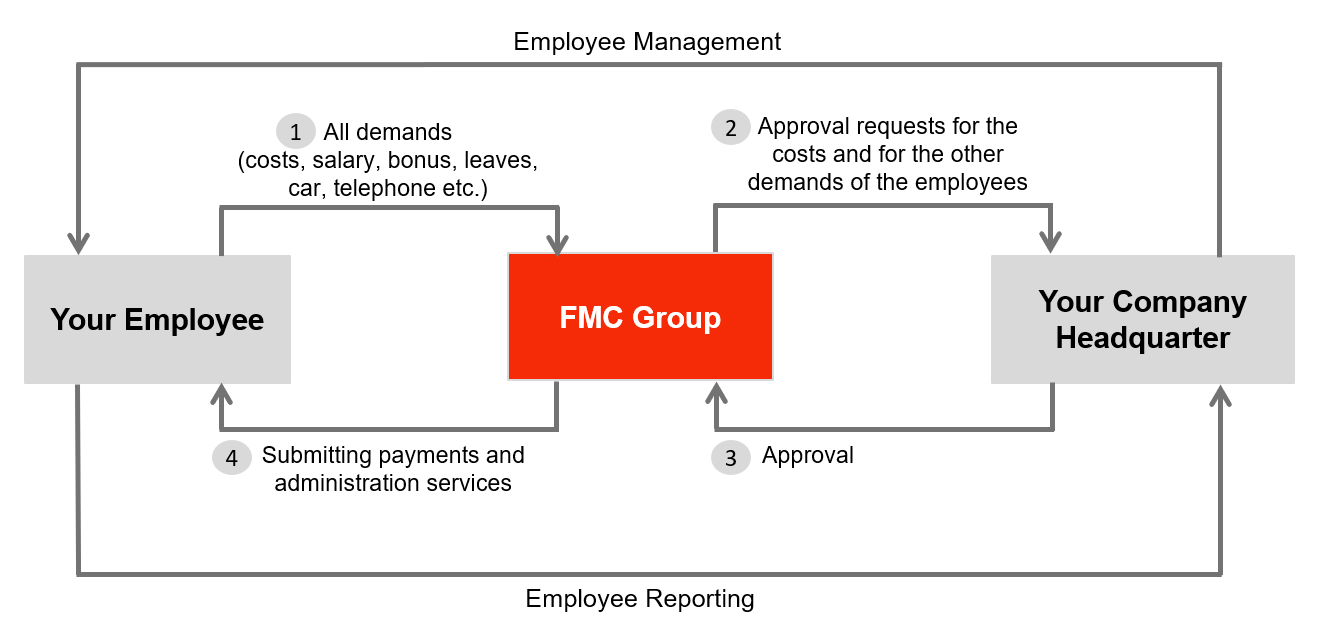
Employer of Record Portugal
Our Employer of Record Portugal service enables clients to hire employees without the need to operate a local legal entity there.
It makes a big difference to develop a new market with your own personnel on the ground. Particularly for functions related to sales & marketing, business development, distributor management, and service & maintenance, our customers are very satisfied using our Portugal Employer of Record Service.
Our customers and their local teams can be free of the distractions of administrative tasks and complex local requirements. So you can fully focus on the development of your core business.
If your local business grows large enough, you can easily transfer the employees to your own subsidiary. It also provides a quick exit strategy if necessary. In addition to Portugal, we offer Employer of Record services in several other countries.
Content:
- Employer of Record Portugal – FMC Group’s Approach
- Hiring an Employee
- Income Tax
- Typical Benefits
- Visa for the Employees
- Time off Policies
- Terminating an Employee

Get in touch with us

Employer of Record Portugal - FMC Group's Approach
- Quick, flexible, and easy entry into Netherlands in compliance with local employment laws
- Complete control over business development with your own team
- Good option for building up, managing, and supporting your distributors and key accounts by directly observing local developments and adjusting the strategy whenever necessary
- Using our comprehensive recruitment experience for international clients, we can form a local team that fits your corporate culture.
- Focusing on your core business instead of dealing with the time-consuming and complex local administrative tasks
- Allowing for easy market exit if necessary
- Integrating your employees into our team through motivational events and special meetings
EOR Portugal Management & Reporting Flow

Hiring in Portugal
Employment Contract – indefinite vs. fixed term
Employers must provide specific details to their employees regarding the employment arrangement, which includes information about the workplace, job responsibilities, contract execution and commencement dates, contract duration (if it’s a fixed-term agreement), vacation period, notice period, working hours, remuneration, and any relevant collective bargaining agreement.
In Portugal, employment contracts must always specify the annual salary and any compensation amounts in euros rather than any other currency.
All employees receive their annual salary distributed over 14 payments, with two of these installments referred to as the 13th- and 14th-month salary or Holidays and Christmas Allowance. Typically, these extra payments are disbursed in June and November.
Probation Period
In Portugal, the standard probationary period in an employment contract usually spans 90 days, and this duration can be extended to 180 days for employees with roles that involve a high degree of technical expertise or significant responsibilities.
In the case of senior executives and managers, the probationary period may be further extended to 240 days.
Work Week, Overtime & Maximum Working Hours
The regular workweek in Portugal consists of 40 hours, with a maximum of 8 hours per day. Any hours worked beyond 8 hours a day or in excess of the hours stipulated in the employment contract are regarded as overtime.
Income Tax
| Taxable Income | Tax Rate (%) |
| up to €7,116 | 14.5% |
| €7,117 – €10,736 | 23% |
| €10,737 – €15,216 | 26,5% |
| €15,217 – €19,696 | 28,5% |
| €19,697 – €25,076 | 35% |
| €25,077 – €36,757 | 37% |
| €36,758 – €48,033 | 43,5% |
| €48,034 – €75,009 | 45% |
| more than €75,009 | 48% |
Typical Benefits
Basic insurance is covered by the national system in Portugal. Employers may choose to provide supplementary health insurance as an optional fringe benefit to their employees. Nowadays, it’s common for employers to offer additional health insurance or provide a financial allowance to cover this aspect.
Furthermore, many employers in Portugal also extend meal allowances to their employees. In the country, bonuses are not obligatory, but some companies in specific industries do offer bonuses as a percentage of the employee’s regular salary for achieving particular milestones or accomplishments.
Apart from these, there are various non-mandatory benefits that employers in Portugal may offer, including supplementary health and life insurance, supplementary pension plans, public transportation allowances, commission structures, and gym memberships.
Visa for the Employees
Obtaining a work permit in Portugal typically requires a job offer because the employer is responsible for initiating the work permit application process on behalf of the foreign worker they intend to hire.
The employer must demonstrate a genuine need for the foreign worker’s skills and expertise, and they are generally expected to provide the necessary documentation and support during the application process. Therefore, securing a job offer is usually a prerequisite for obtaining a work permit in Portugal.
Time off Policies
Public Holidays
In Portugal, it is customary for all employees to have a day off on public holidays.
- New Year – January 1
- Good Friday – March 30
- Liberty Day – April 25
- Labour Day – May 1
- Corpus Christi – May 31
- Portugal Day – June 10
- Assumption of Mary – 15th Augusts
- Establishment of the Portuguese Republic – October 5
- All Saints’ Day – November 1
- Restoration of Independence – December 1
- Immaculate Conception – December 8
- Christmas – December 25
Annual Leave
The legal minimum requirement in Portugal is that employees are entitled to a minimum of 22 paid vacation days.
In the initial 6 months of their employment, employees accrue 2 vacation days each month but can only take these accumulated days off after completing the full 6 months of their employment.
Sick Leave
In Portugal, Social Security covers the absence due to illness but does not provide compensation for the initial 3 days.
Sick leave becomes remunerated starting from the 4th day onwards. This means that if an employee is absent for 3 days with a certified medical justification, the company may deduct the salary for those 3 days, even though the absences are considered justified.
Employees can receive sick pay for a maximum of 1,095 days. Typically, the sick pay ranges from 55% to 75% of the employee’s regular salary.
Other Leave Types
- Maternity Leave: In Portugal, new mothers are entitled to take maternity leave for a duration of 120 days. This leave is financially supported by Social Security.
- Paternity Leave: There is a mandatory paternity leave of 20 days provided to fathers in Portugal. Additionally, fathers have the option to take an extra five days of leave if they choose to do so.
Terminating an Employee
Dismissals in Portugal generally follow specific rules and procedures:
- Disciplinary Dismissals: Disciplinary dismissals do not require advance notice, but they must be based on valid reasons and involve a formal disciplinary procedure.
- Objective Dismissals: Termination initiated by employers (objective dismissal) is more complex and necessitates a valid reason, a disciplinary procedure, and compensation equivalent to 12 days of basic pay and seniority allowances for each year of service.
- Notice Period for Objective Dismissals: The notice period for objective dismissals varies based on the employee’s seniority:
- Less than or equal to 1 year: 15 days’ notice
- 1 year to less than 5 years: 30 days’ notice
- 5 years to less than 10 years: 60 days’ notice
- 10 years or more: 75 days’ notice
- Legal Remedy: Dismissed employees have the right to file a claim before a labor court if they believe their dismissal was unjust or did not comply with the established procedures and regulations.
Disclaimer: Although we carefully researched and compiled the above information, we do not give any guarantee with respect to the actuality, correctness, and completeness.
